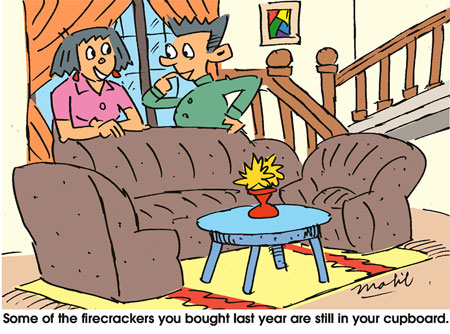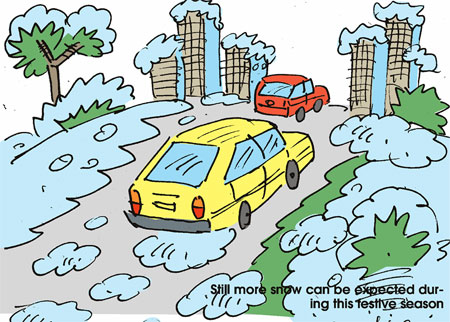|
 by
R. S. Karunaratne by
R. S. Karunaratne
More on subject - verb agreement
All / all of
When we use ‘all’ or ‘all of’ before an uncountable noun, we use a
singular verb.
All of the equipment in the factory was purchased from China.
All the furniture in the house was polished recently.
All the cotton grown in India is exported overseas.

All the traffic was diverted because of the car race.
All the milk has turned sour.
When we use ‘all’ or ‘all of’ before a plural noun or pronoun, we use a
plural verb.
All the speakers wear ties.
All of us welcome your ideas.
All the students are coming for the party.
All the figures on the rate of accidents are accurate.
All of them are interested in learning English.
Some / some of
When we use ‘some’ or ‘some of’ before an uncountable noun, we use a
singular verb.
Some milk is still left in the bottle.
Some of the paint is still wet.
Some of the food is stale.
Some of the oil has spilt onto the table.
Some tomato soup is still simmering on the stove.
When we use ‘some’ or ‘some of’ before a plural noun or pronoun, we use
a plural verb.
Some of the students have explained their problems to the principal.
Some girls are still reading in the library.
Some of the firecrackers you bought last year are still in your
cupboard.
Some of the boys in your class are singing and dancing.
Some of the lawyers are exchanging blows over an argument.
Each
We use ‘each’ before a singular noun followed by a singular verb.
Each parent has to take charge of one child.
Each person who took part in the campaign was given refreshments.
Each orchid plant is carefully tended.
Each child was given a school bag.
Each official on duty has to wear a badge.
Each speaker was allotted five minutes to talk.
One
We use ‘one’ before a singular noun followed by a singular verb.
One accused was sentenced to rigorous imprisonment.
One student has been selected to represent the school.
One girl from the senior class is absent today.
One passenger was fatally wounded in the accident.
One teacher does not do his job well.
Each of
We use ‘each of’ before a plural noun. It is followed by a singular
verb.
Each of the new directors is assigned specific duties.
Each of the stories in the book contains myths.
Each of my friends drives cars.
Each of the new doctors was taken to the director.
One of
We use ‘one of’ before a plural noun followed by a singular verb.
One of the parents has left the child at the gate.

One of the new recruits is sure to be promoted.
One of them is sure win the the prize.
One of my earrings is missing.
One of my friends has sent me a New Year card.
[Activity]
Tick the correct sentences and check your answers with the key.
1. Some of the wet paint have stuck to my sari.
2. All of them welcomes your views.
3. Some of the milk served today are sour.
4. One of my rings are missing.
5. Each of those books contain Greek myths.
6. All the students in the class is jubilant over their victory.
7. Some of the ink have spoilt my shirt.
8. Each bo sapling are looked after carefully.
9. One boxer have been selected to be sent abroad.
10. All the marbles in my bag is damaged.
Key:
All the sentences given above are incorrect. Read the lesson once
again and try to find out why they are wrong. Happy learning!
Technical terms used in English
We use many technical terms in English. Here is a quiz to test your
knowledge about them.
Write the technical term for each of the following sets of words and
check your answers with the key.
1. A syllable, not a word in itself, which can be added to an
existing word to change its meaning. ...............
2. The use in a phrase or sentence of words that begin with, or
contain, the same letter or sound: ...............
3. A re-arrangement of the letters of a word or phrase which produces
another word or phrase: ...................
4. Words arranged to stress a contrast: ....................
5. A word whose meaning is directly opposite to that of another word:
.................
6. A group of words containing a subject and predicate but not
expressing a complete idea: .................
7. A short poem, especially one with a witty twist in it:
..................
8. The study of the origin of words: ..................
9. Disguising a nasty fact with a nice name: ........................
10. The distinction of nouns according to sex: ......................
11. A noun formed from a verb by adding ‘-ing’ : ..............
12. A word that looks the same as another word but has a different
meaning: ...................
Key:
1. Affix 2. Alliteration 3. Anagram 4. Antithesis 5. Antonym 6.
Clause 7. Epigram 8. Etymology 9. Euphemism 10. Gender 11. Gerund 12.
Homonym
Starters:
How to use ‘still’ and ‘yet’
‘Still’ means “continuing to happen or continuing to be done.”
The boy is still hungry.
I still haven’t passed my examination.
There is still no news of the missing divers.
Do you still work for the same employer?

The cobra is still alive.
‘Still’ also means “despite that.”
I don’t approve of what you did, but you’re still my friend.
I know you don’t like me now, but I still have some regard for you.
Although I was a stranger, she still volunteered to help me.
We don’t meet regularly, but we still remain friends.
Even though the cost of living has gone up, I can still manage with my
salary.
Sometimes, ‘still’ can mean “to an even greater degree.”
The number of people disappeared due to the recent floods is likely to
rise still higher.
Our company is expanding its market still further.
Still more snow can be expected during this festive season.
Mother is worried that her son’s car has broken down, or worse still,
that he has had an accident.
Why does she want to tell me still more lies?
Note: We use ‘still’ directly before the main verb in a sentence.
I can still remember the day we met.
Do you still live in Colombo?
You still have time to think it over.
I still go to the same hotel for lunch.
We still remain friends.
We use ‘still’ after ‘be’ verbs.
Tanya is still my best friend.
The refugees are still living in temporary sheds.
I am still studying for G.C.E. O/L examination.
Anne was still attractive when I met her recently.
We are still working for the same newspaper.
‘Still’ can be used in the sense ‘not moving.’
Some children find it difficult to sit still for a long time.
You have to sit still until I take your photograph.
The air remains still and I feel very warm here.
Still waters run deep. (Proverb)
In the still of the night, nothing moved.
Note: A stillbirth is the birth of a dead baby.
A stillborn baby is a baby born dead.
In art ‘still life’ is a type of painting of objects that do not move.
E.g. flowers, trees
Yet
As an adverb ‘yet’ means “until the present time.”
I haven’t met her yet.
A: Are you ready?
B: Not yet.
I have listened to many of her songs, but this is the best yet.
The chief guest has not arrived yet.
The Christmas season is not over yet.
We use ‘yet’ to add emphasis.
Kamal has bought yet another house.
I’m sorry to bother you yet again.
I’ve given him yet more work to do.
[Activity]
Fill in the blanks with ‘still’ or ‘yet’. Check your answers with the
key.
1. A: Does your son work?
B: No, he’s ......... at school.
2. I ate a lot but I’m .............. hungry.
3. A: Where’s Rohan?
B: He isn’t here ..............
4. Do you ................. work at Donald’s?
5. A: Are you ready to go?
B: Not .............. Wait a minute.
6. A; Did you sell your motorcycle?
B: No, I’ve ........... got it.
7. Preethi hasn’t gone ............... She’s ............. here.
8. Has it stopped raining ................?
9. A: Is it raining?
B: Yes, it’s ................ raining.
10. A: Has he come/
B: No, he hasn’t come ................
Key:
1. still 2. still 3. yet 4. still 5. yet 6. still 7. yet, still 8.
yet 9. still 10. yet
Collocation for beginners
Collocation is the way words combine in a language to produce natural
sounding speech and writing. For example, we say “strong wind” but
“heavy rain”. We do not say “heavy wind” or “strong rain.”
Here is a quiz to test your ability to find the words that go
together. Check your answers with the key.
[Adjectives] [Nouns]
1. Classified ...................
2. Sound ...................
3. Chief ...................
4. Great ...................
5. Sordid ...................
6. Strong ...................
7. Close ...................
8. Personal ...................
9. Immediate ...................
10. Friday ...................
11. Tender ...................
12. Government ..................
13. Hidden ...................
14. Travel ...................
15. Open ...................
16. Amazing ...................
17. Extreme ...................
18. Intense ...................
19. Formal ...................
20. Organic ...................
21. Development .................
22. Close ...................
23. Common ...................
24. Chief ...................
25. Hot ...................
Nouns:
A. advertisement
B. advice
C. adviser
D. aftermath
E. ailment
F. age
G. advocate
H. aim
I. affinity
J. affair
K. air
L. affront
M. affection
N. afternoon
O. aide
P. aid
Q. agriculture
R. agency
S. agreement
T. agony
U. agenda
V. agitation
W. agility
X. aggression
Y. agent
Key:
1. A
2. B
3. C
4. G
5. J
6. M
7. I
8. L
9. D
10. N
11. F
12. R
13. U
14. Y
15. X
16. W
17. V
18. T
19. S
20. Q
21. P
22. O
23. E
24. H
25. K |



